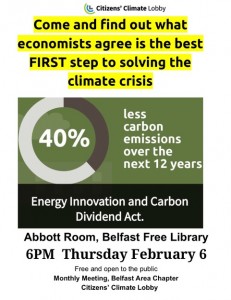From an Essay by Ann OBrien, Daily Camera, January 24, 2020
The January 11th front-page article in the Daily Camera reveals the horrifying effects from the massive wildfires in Australia. While the devastating loss of human lives, property and animals will take decades to overcome, some of the losses will be permanent. If the fires in Australia teach us anything, it is that the time to act on climate change is now.
The need to stem the tide of extreme weather events in the United States and across the globe takes up a big space in my brain. Unfortunately, in recent times, both ends of the political spectrum no longer speak civilly to one another, let alone address the critical issue of climate change. But there is a ray of hope that has put me and many others on an active path to promote a solution to address the damage to our climate.
The work of Citizens’ Climate Lobby is helping to break down the gridlock created by the current divisions over climate change in our nation. CCL is an international nonpartisan organization dedicated to educating legislators and citizens about a practical solution to reduce carbon emissions. CCL has over 400 chapters worldwide that are dedicated to using civil conversation and active listening skills to overcome the divisions that subvert our commitment to address climate change. The lobbying that CCL engages in is best described as gentle, but persistent, persuasion.
I believe that the CCL-endorsed Energy Innovation and Carbon Dividend Act (H.R.763) that is now in Congress offers a way forward to reduce the output of carbon in our country. Members of Congress who wish to join Citizens’ Climate Lobby must join with a member of the opposite party. This ensures a nonpartisan approach that acknowledges the need to reduce carbon emissions. CCL’s work to bring Congress on board and to gather support among local businesses and nonprofits is ongoing.
H.R. 763 has been studied and endorsed by well over 1,000 economists. H.R. 763 is co-sponsored by both Republicans and Democrats in Congress. If passed, this legislation is projected to produce 40% less carbon over 12 years. Please go to citizensclimatelobby.org to learn more about H.R. 763 and about the work CCL is engaged in.
Colorado has 14 active CCL chapters. My concerns about the impacts of climate change caused me to join the Boulder CCL a year ago. I received a warm welcome. I continue to find their approach refreshing and upbeat. The group combines a mix of ages and political views of members who are united in the work of reducing carbon emissions. Party politics are left at the door. Working with CCL has rekindled my hope that we will stabilize our climate in the years to come.
If you wish to learn about the work of CCL or use your skills in this important effort, there are Boulder County chapters in Boulder, Longmont and the University of Colorado Boulder that can be found through a Google search, at these locations or elsewhere.
The time is now.
>>> Ann OBrien lives in Boulder, Colorado, USA
###############################
See also: The Energy Innovation and Carbon Dividend Act of 2019 (H.R. 763) is a bill in the United States House of Representatives that proposes a fee on carbon at the point of extraction to encourage market-driven innovation of clean energy technologies to reduce greenhouse gas emissions. The fees are recycled to citizens in monthly dividends. The act was originally introduced in 2018 with bipartisan support from six co-sponsors and died when the 115th congress ended on January 3, 2019. It is principally based on Citizens’ Climate Lobby’s carbon fee and dividend proposal, and this organization advocates for the bill.

